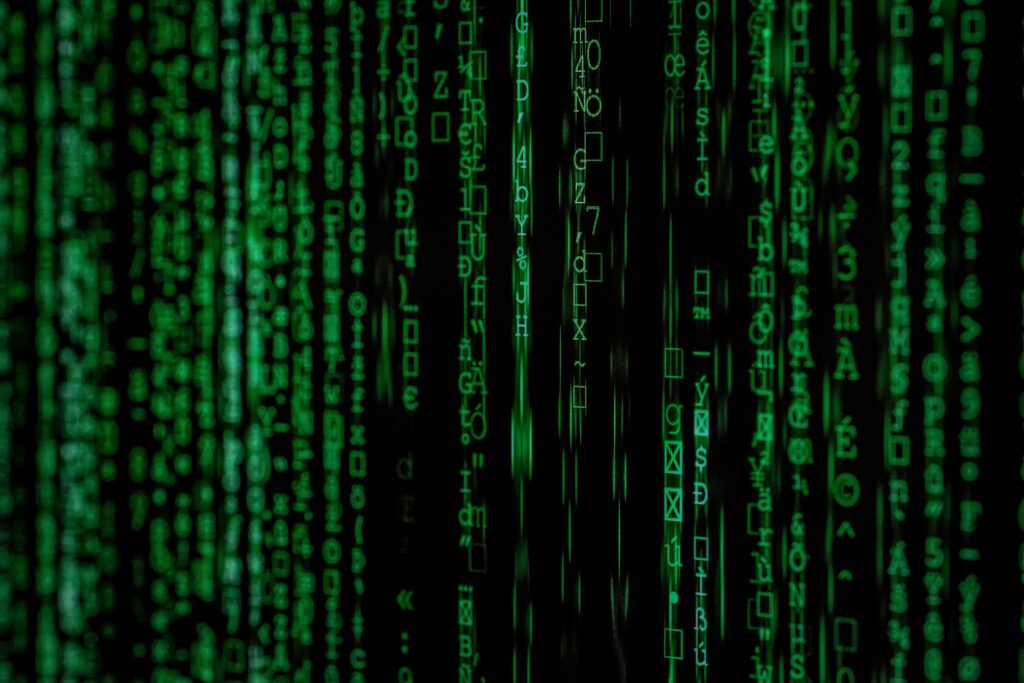Photo by Markus Spiske on Unsplash
Neste vídeo de Fábio Pacucci, para o canal TED-ED, são feitas algumas perguntas inquietantes. Como você sabe que é uma pessoa que viveu sua vida, em vez de um cérebro recém-formado cheio de memórias artificiais, alucinando momentaneamente uma realidade que na verdade não existe? Isso pode parecer absurdo, mas manteve várias gerações de grandes cosmólogos acordados à noite. Eles chamam isso: o paradoxo do cérebro de Boltzmann.
| Audio | |
|---|---|
Normal | Slow |
| English Transcript | Tradução |
| How do you know you're a person who has lived your life, rather than a just-formed brain full of artificial memories, momentarily hallucinating a reality that doesn't actually exist? | Como você sabe que é uma pessoa que viveu sua vida, em vez de um cérebro recém-formado cheio de memórias artificiais, alucinando momentaneamente uma realidade que na verdade não existe? |
| That may sound absurd, but it's kept several generations of top cosmologists up at night. | Isso pode parecer absurdo, mas manteve várias gerações de grandes cosmólogos acordados à noite. |
| They call it the Boltzmann brain paradox. | Eles chamam isso de paradoxo do cérebro de Boltzmann. |
| Its namesake, Ludwig Boltzmann, was a 19th century physicist operating in a period when scientists were passionately debating whether the universe had existed for an infinite or finite time. | Seu homônimo, Ludwig Boltzmann, foi um físico do século 19 operando em um período em que os cientistas debatiam apaixonadamente se o universo existia por um tempo infinito ou finito. |
| Boltzmann's main claim to fame was revolutionizing thermodynamics, the branch of physics that studies energy. | A principal reivindicação de Boltzmann à fama foi revolucionar a termodinâmica, o ramo da física que estuda a energia. |
| He put forward a new interpretation of entropy, which is a measure of the disorder of a system. | Ele apresentou uma nova interpretação da entropia, que é uma medida da desordem de um sistema. |
| A glass is an ordered system, whereas a shattered glass is disordered. | Um vidro é um sistema ordenado, enquanto um vidro quebrado é desordenado. |
| The second law of thermodynamics states that closed systems tend towards disorder: you won't see a shattered glass return to its pristine state. | A segunda lei da termodinâmica afirma que os sistemas fechados tendem à desordem: você não verá um vidro quebrado retornar ao seu estado primitivo. |
| Boltzmann's insight was applying statistical reasoning to this behavior. | O insight de Boltzmann foi aplicar o raciocínio estatístico a esse comportamento. |
| He found that a system evolves to a more disordered state because it's more likely. | Ele descobriu que um sistema evolui para um estado mais desordenado porque é mais provável. |
| However, the opposite direction isn't impossible, just so unlikely that we'll never witness things like scrambled eggs turning raw. | No entanto, a direção oposta não é impossível, apenas tão improvável que nunca testemunharemos coisas como ovos mexidos ficando crus. |
| But if the universe exists over an infinitely long time, extremely unlikely events will happen, including complex things forming out of random combinations of particles. | Mas se o universo existir por um tempo infinitamente longo, eventos extremamente improváveis acontecerão, incluindo coisas complexas formadas a partir de combinações aleatórias de partículas. |
| So what does that look like in a hypothetical infinitely old universe? | Então, como isso se parece em um universo hipotético infinitamente antigo? |
| In this unremarkable stretch of near-nothingness, about eight octillion atoms randomly come together to form a replica of the Thinker made of pasta. | Nesse trecho comum de quase nada, cerca de oito octilhões de átomos se juntam aleatoriamente para formar uma réplica do Pensador feita de espagueti. |
| It instantly dissolves. | Dissolve-se instantaneamente. |
| Over here, these particles suddenly form something like a brain. | Por aqui, essas partículas de repente formam algo como um cérebro. |
| It's filled with false memories of a lifetime up to the present moment, when it perceives a video saying these very words, before decaying. | Está cheio de falsas memórias de uma vida inteira até o momento presente, quando percebe um vídeo dizendo essas mesmas palavras, antes de decair. |
| And finally, by random fluctuations, all the particles in the cosmos concentrate in a single point, and an entire new universe spontaneously bursts into existence. | E, finalmente, por flutuações aleatórias, todas as partículas do cosmos se concentram em um único ponto, e todo um novo universo surge espontaneamente. |
| Of those last two, which is more likely? | Desses dois últimos, qual é o mais provável? |
| The brain, by far? | O cérebro, de longe? |
| despite all its complexity, it's a blip compared to an entire universe. | Apesar de toda a sua complexidade, é um pontinho comparado a um universo inteiro. |
| Every one universe produced by random fluctuations has equivalent odds to heaps upon heaps of insta-brains. | Cada universo produzido por flutuações aleatórias tem chances equivalentes de montes e montes de cérebros instantâneos. |
| So by this reasoning, it seems extremely more likely that everything you believe to exist is actually a brief illusion, soon to be extinguished. | Então, por esse raciocínio, parece extremamente mais provável que tudo o que você acredita existir seja na verdade uma breve ilusão, que logo será extinta. |
| Boltzmann didn't get quite that far in his thinking; the brains themselves were introduced by later cosmologists building on his work. | Boltzmann não foi tão longe em seu pensamento; os próprios cérebros foram introduzidos por cosmólogos posteriores com base em seu trabalho. |
| But they, like just about everyone else, were pretty sure that they themselves weren't just ephemeral brains. | Mas eles, como quase todo mundo, tinham certeza de que eles próprios não eram apenas cérebros efêmeros. |
| So the paradox was: how could they be correct and the universe be eternal? | Então o paradoxo era: como eles poderiam estar corretos e o universo ser eterno? |
| The resolution is something most take for granted today: that our universe has not existed forever, but rather time and space started with a Big Bang. | A resolução é algo mais dado como certo hoje: que nosso universo não existiu para sempre, mas sim o tempo e o espaço começaram com um Big Bang. |
| So that's the paradox over and done with, right? | Então esse é o paradoxo e acabou, certo? |
| Well, maybe not. | Bem, talvez não. |
| In the last century, scientists have found evidence supporting the theory of the Big Bang everywhere we look. | No século passado, os cientistas encontraram evidências que apoiam a teoria do Big Bang em todos os lugares que olhamos. |
| Yet while we know that the Big Bang happened, no one knows what, if anything, preceded and caused it. | No entanto, embora saibamos que o Big Bang aconteceu, ninguém sabe o que, se alguma coisa, o precedeu e o causou. |
| Why did the universe begin in such an extremely ordered, and unlikely, state? | Por que o universo começou em um estado tão extremamente ordenado e improvável? |
| Is our universe in an unending cycle of creation and collapse? | Nosso universo está em um ciclo interminável de criação e colapso? |
| Or might we be in one of many universes expanding within a multiverse? | Ou podemos estar em um dos muitos universos em expansão dentro de um multiverso? |
| In this context, Boltzmann's paradox has found renewed interest by contemporary cosmologists. | Nesse contexto, o paradoxo de Boltzmann encontrou um interesse renovado por cosmólogos contemporâneos. |
| Some argue that leading models for where the universe came from still imply that Boltzmann brains are more likely than human brains, suggesting something's amiss. | Alguns argumentam que os principais modelos de onde o universo veio ainda implicam que os cérebros de Boltzmann são mais prováveis do que os cérebros humanos, sugerindo que algo está errado. |
| Others counter that slight modifications of the cosmological models would avoid the problem, or that Boltzmann's brains can't actually physically form. | Outros contestam que pequenas modificações nos modelos cosmológicos evitariam o problema, ou que os cérebros de Boltzmann não podem se formar fisicamente. |
| Some researchers even attempted to calculate the probability of a brain popping out of random quantum fluctuations long enough to think a single thought. | Alguns pesquisadores até tentaram calcular a probabilidade de um cérebro sair de flutuações quânticas aleatórias por tempo suficiente para pensar um único pensamento. |
| They got this incredible number whose denominator is 10 to a number about a septillion times larger than the number of stars in the universe. | Eles obtiveram esse número incrível cujo denominador é de 10 a um número cerca de um septilhão de vezes maior que o número de estrelas no universo. |
| The Boltzmann brain paradox, despite its absurdity, is useful because it creates a bar that models have to rise to. | O paradoxo do cérebro de Boltzmann, apesar de seu absurdo, é útil porque cria uma marca que os modelos têm que superar. |
| If, compared to numbers like this one, the current state of the universe is exceedingly unlikely, something in the model is almost certainly wrong. | Se, comparado a números como este, o estado atual do universo é extremamente improvável, algo no modelo está quase certamente errado. |
| Unless you're the one who is wrong ... | A não ser que você seja quem está errado … |
Contagem de palavras
A tabela abaixo exibe as palavras encontradas neste vídeo, bem como o número de vezes em que aparecem.
Veja também: Para que serve esta tabela?
| Freq. | Palavra | Freq. | Palavra | Freq. | Palavra |
|---|---|---|---|---|---|
| 33 | the | 28 | a | 23 | of |
| 18 | that | 18 | is | 16 | to |
| 13 | universe | 13 | in | 10 | it |
| 8 | and | 7 | not | 7 | an |
| 6 | this | 6 | by | 6 | brains |
| 6 | brain | 5 | you | 5 | they |
| 5 | so | 5 | paradox | 5 | one |
| 5 | more | 5 | like | 5 | boltzmann |
| 4 | were | 4 | we | 4 | was |
| 4 | unlikely | 4 | state | 4 | random |
| 4 | likely | 4 | just | 4 | its |
| 4 | has | 4 | but | 4 | boltzmann's |
| 4 | be | 3 | with | 3 | will |
| 3 | time | 3 | than | 3 | system |
| 3 | something | 3 | particles | 3 | over |
| 3 | or | 3 | number | 3 | models |
| 3 | if | 3 | glass | 3 | found |
| 3 | form | 3 | for | 3 | fluctuations |
| 3 | extremely | 3 | cosmologists | 3 | big |
| 3 | bang | 3 | are | 3 | actually |
| 3 | about | 2 | wrong | 2 | who |
| 2 | which | 2 | when | 2 | what |
| 2 | up | 2 | things | 2 | these |
| 2 | thermodynamics | 2 | themselves | 2 | some |
| 2 | single | 2 | shattered | 2 | scientists |
| 2 | reasoning | 2 | rather | 2 | out |
| 2 | our | 2 | ordered | 2 | new |
| 2 | memories | 2 | look | 2 | long |
| 2 | last | 2 | know | 2 | infinitely |
| 2 | how | 2 | his | 2 | heaps |
| 2 | he | 2 | have | 2 | far |
| 2 | existed | 2 | exist | 2 | entire |
| 2 | does | 2 | disordered | 2 | disorder |
| 2 | did | 2 | despite | 2 | compared |
| 2 | century | 2 | because | 2 | all |
| 1 | your | 1 | yet | 1 | would |
| 1 | work | 1 | words | 1 | witness |
| 1 | within | 1 | why | 1 | whose |
| 1 | while | 1 | whether | 1 | whereas |
| 1 | where | 1 | well | 1 | video |
| 1 | very | 1 | useful | 1 | upon |
| 1 | unremarkable | 1 | unless | 1 | universes |
| 1 | unending | 1 | two | 1 | turning |
| 1 | towards | 1 | top | 1 | together |
| 1 | today | 1 | times | 1 | thought |
| 1 | those | 1 | thinking | 1 | thinker |
| 1 | think | 1 | theory | 1 | th |
| 1 | tend | 1 | take | 1 | systems |
| 1 | sure | 1 | supporting | 1 | suggesting |
| 1 | suddenly | 1 | such | 1 | studies |
| 1 | stretch | 1 | still | 1 | statistical |
| 1 | states | 1 | started | 1 | stars |
| 1 | spontaneously | 1 | space | 1 | sound |
| 1 | soon | 1 | something's | 1 | slight |
| 1 | several | 1 | septillion | 1 | seems |
| 1 | see | 1 | second | 1 | scrambled |
| 1 | saying | 1 | rise | 1 | right |
| 1 | revolutionizing | 1 | return | 1 | resolution |
| 1 | researchers | 1 | replica | 1 | renewed |
| 1 | reality | 1 | raw | 1 | randomly |
| 1 | quite | 1 | quantum | 1 | put |
| 1 | produced | 1 | problem | 1 | probability |
| 1 | pristine | 1 | pretty | 1 | present |
| 1 | preceded | 1 | popping | 1 | point |
| 1 | physics | 1 | physicist | 1 | physically |
| 1 | person | 1 | period | 1 | perceives |
| 1 | pasta | 1 | passionately | 1 | others |
| 1 | opposite | 1 | operating | 1 | on |
| 1 | old | 1 | odds | 1 | octillion |
| 1 | numbers | 1 | nothingness | 1 | no |
| 1 | night | 1 | never | 1 | near |
| 1 | namesake | 1 | multiverse | 1 | most |
| 1 | momentarily | 1 | moment | 1 | modifications |
| 1 | model | 1 | might | 1 | measure |
| 1 | maybe | 1 | may | 1 | many |
| 1 | main | 1 | made | 1 | ludwig |
| 1 | lived | 1 | lifetime | 1 | life |
| 1 | leading | 1 | law | 1 | later |
| 1 | larger | 1 | knows | 1 | kept |
| 1 | introduced | 1 | into | 1 | interpretation |
| 1 | interest | 1 | instantly | 1 | insta |
| 1 | insight | 1 | infinite | 1 | incredible |
| 1 | including | 1 | impossible | 1 | imply |
| 1 | illusion | 1 | hypothetical | 1 | human |
| 1 | however | 1 | here | 1 | happened |
| 1 | happen | 1 | hallucinating | 1 | had |
| 1 | granted | 1 | got | 1 | get |
| 1 | generations | 1 | full | 1 | from |
| 1 | forward | 1 | forming | 1 | formed |
| 1 | forever | 1 | finite | 1 | finally |
| 1 | filled | 1 | fame | 1 | false |
| 1 | extinguished | 1 | expanding | 1 | exists |
| 1 | existence | 1 | exceedingly | 1 | evolves |
| 1 | evidence | 1 | everywhere | 1 | everything |
| 1 | everyone | 1 | every | 1 | events |
| 1 | even | 1 | eternal | 1 | equivalent |
| 1 | ephemeral | 1 | entropy | 1 | enough |
| 1 | energy | 1 | else | 1 | eight |
| 1 | eggs | 1 | done | 1 | do |
| 1 | dissolves | 1 | direction | 1 | denominator |
| 1 | decaying | 1 | debating | 1 | cycle |
| 1 | current | 1 | creation | 1 | creates |
| 1 | counter | 1 | could | 1 | cosmos |
| 1 | cosmological | 1 | correct | 1 | context |
| 1 | contemporary | 1 | concentrate | 1 | complexity |
| 1 | complex | 1 | come | 1 | combinations |
| 1 | collapse | 1 | closed | 1 | claim |
| 1 | certainly | 1 | caused | 1 | cannot |
| 1 | came | 1 | call | 1 | calculate |
| 1 | bursts | 1 | building | 1 | brief |
| 1 | branch | 1 | blip | 1 | believe |
| 1 | behavior | 1 | begin | 1 | before |
| 1 | bar | 1 | avoid | 1 | attempted |
| 1 | atoms | 1 | at | 1 | artificial |
| 1 | argue | 1 | applying | 1 | anything |
| 1 | amiss | 1 | almost | 1 | absurdity |
| 1 | absurd |









